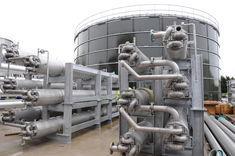
Scottish Water Horizons is encouraging the food industry to make a fresh start in 2010 by recycling food waste, helping to cut costs and divert food from landfill.
Currently the Deerdykes Organics Recycling Facility in Cumbernauld composts food and garden waste. However, from spring next year, a £7 million anaerobic digestion unit will turn 30,000 tonnes of solid and liquid food waste into around 8,000 megawatts of power each year - enough electricity to power up to 2,000 homes.
Scottish Water Horizons, the commercial arm of Scottish Water, is keen to establish supply streams with the food sector - the processing, manufacture and retail industries all generate solid and liquid waste that could be turned to electricity at the site.
The anaerobic digestion unit is being constructed by Henry Boot Scotland and Monsal. The digester tank is being supplied and erected by UK-based Kirk Environmental.
Chris Banks, commercial director of Scottish Water, said: “The unit harnesses biogas produced by the breakdown of organic materials. The biogas will then be used in a combined heat and power engine to produce electricity and heat.
“This electricity will be used at Deerdykes and any surplus will either be used to power the neighbouring industrial estate or delivered back to Scottish Water, via the national grid, as part of the company's vision to become a low-carbon water company. A scheme to export the heat to local homes and businesses is also being investigated.”
The process also produces nutrient-rich digestate, which can be used as a liquid fertiliser to improve the nutritional content of Scotland’s soil resources.
Iain Gulland, WRAP director for Scotland, said: “Having invested £1.7m in the Deerdykes Anaerobic Digestion project, it is great to see that it is on track. This is clearly going to be an impressive, high-quality facility which will play a key role in diverting food waste from landfill and reducing greenhouse gas emissions.”
Donald MacBrayne, business development manager for Scottish Water Horizons, said: “We’ve had a fantastic start to these and local residents have been incredibly supportive, showing a real ‘green’ streak.”
The anaerobic digestion process will run alongside the existing pod composting facility at Deerdykes, which has turned more than 100,000 tonnes of grass cuttings, tree trimmings and shrub prunings into 50,000t of environmentally friendly compost since 2006.



